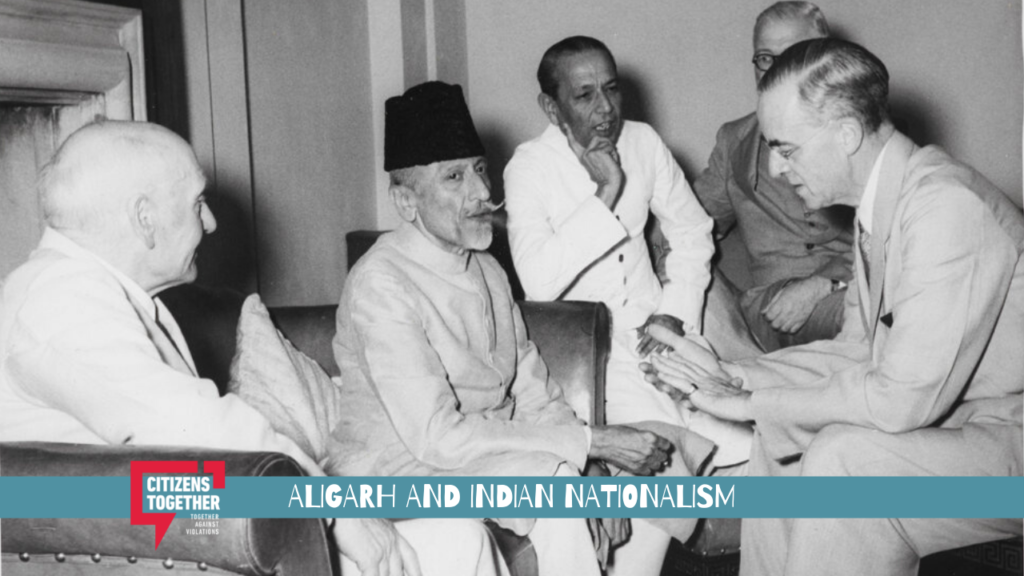On February 20, 1949 Maulana Azad, then Education Minister of India was invited for convocation address at Aligarh Muslim University. There he delivered a speech on “Aligarh and Indian Nationalism”. Here is one interesting part from his speech in which he directly addressed the newly graduates and asked them believe them in what he believed.
An educational institution which has such a glorious past must necessarily hold the promise of an equally glorious future. I am not aware what the state of your minds is today, nor in what colours the future appears to you. Does it bring to you the message of closing doors or of opening gates that introduce you to new vistas of experience? I do not know what visions are before you, but I will tell you what visions I see. You perhaps feel that doors that were open have been closed. I see that doors that were locked have now opened. In the words of the Persian Poet,
Tafawut ast main-i-shanidan-i-man-o-to
Tu bastan-i-dar, 0, manfatahe-bab me shanwam.
What you and I hear are different. You hear the sound of closing doors but I of doors that open. I want that I should speak to you frankly and without mental reservations and I am sure that this is what you would expect of me. If I thought that you were still living in that atmosphere of communal politics which was prevalent before the 15th of August, 1947, I would without hesitation say that your future does not hold that promise which, as an Indian Muslim, I would like you to have. I am glad that there has been a profound change since then and the signs of a new era are becoming clearer every day. You have realised in good time what the intellectual atmosphere of this institution must be in the changed circumstances of today.
You have responded to the call of the new times and created conditions which are in conformity with the changed outlook. I have no hesitation in saying that by conforming to the spirit of the times, you have rendered a great service not only to this Institution but to all Muslims of the Indian Union. For this, I extend to you my sincere congratulations. I would like to describe to you briefly the Central Government’s plan and programme of national education and the plade which an institution like Aligarh University will have in that new scheme. I think you will agree that the educational set-up for a secular and democratic State must be secular. It should provide for all citizens of the State the same type of education without any distinction. It should have its own intellectual flavour and its own national character. It should have as its aim the ideal of human progress and prosperity. The Indian Union has set before itself, such a scheme of common education for all without distinction or discrimination in favour of any community or group.
At the same time, it recognises that there is scope for educational institutions which emphasise certain special types of learning. Their doors should, however, be open to all who are interested in such studies. This is the sphere of national education in which your institution can find its proper place in conformity with the spirit of the times. In this way, you will, in spite of your special characteristics, be a part of the general scheme of education and serve a special function in it. For this you must, however, display the widest catholicity of spirit. It is said that Plato had the following text inscribed on his Academy: “Those who do not know Geometry, have no place here.” Your Institution must not have even such a restricting clause. Your motto should be that you will welcome both those who “know Geometry” and those who “do not.”
I am aware that the governing principle in your Institution has been from the very beginning wide and liberal. When your College was founded, the very first batch of students included Hindus as well as Muslims. Your staff has also been recruited from all communities. The names of certain Hindu professors have become part of your Institution’s history. I am sure that these traditions will be broadened and further enriched in the comae of time.
Study and research in Islamic learning and Islamic history have been part of your tradition. I must say that, after the death of Sir Syed, it no longer displayed the vigour it had during his days. Even after the University was established, old hopes were not fulfilled. Your duty today is to revive those old traditions and to create in your University an atmosphere of research and enquiry into all the spheres of knowledge.
I have already reminded you that Aligarh was the place where modem Urdu literature developed. This is an achievement of which your University can be rightly proud. It is your duty to cherish this heritage and further enrich it. I must, however, remind you that your literary efforts must have a wider field than in the past. You should take an equal interest in Hindi litera- ture. Muslims have been noted for their interest in different languages and literatures. Hindi literature has the same claim on the Muslims as on the Hindus of India. Both the communities have contributed equally to the development of Urdu and Hindi literatures. The new literature in Brij Bhasha which commenced in the Mughul period was the result of the patronage of rulers like Akbar and Jehangir and the contributions of writers of genius like Mohammad Jayesi, Khan Khanan and AbdulJalil Bilgrami. We find that, up to the end of the 18th century, the number of Muslim poets who wrote in Brij Bhasha is considerable. The time has come when you must revive that old tradition. I desire that this Institution should produce a large number of writers who are equally at home with Hindi and Urdu literatures.
The question of script is one of the controversial problems of today. You know what the opinion of Gandhiji was in this respect. His sincere desire was that every Indian should know both the Urdu and the Devanagri scripts. That is why he founded the Hindusthani Prachar Sabha and made it an essential condition that its workers should know both the scripts. This has also been my opinion for years. I feel that this is the only solution which is possible in the present circumstances. I hope that the lovers of Urdu literature will not wait to find out the reactions of the advocates of Hindi literature, but will themselves do what they regard as conducive to the best interests of the country. In every other sphere of life, one may wait to see what others do, but in the field of learning we can wait for others only at the risk of detracting from our credit. If others are content to know only one script, we need not be sorry that we have learnt two, My sincere desire is that every Muslim in India should learn both the scripts, and thus set an example before the country. This was the message of Mahatma Gandhi, and I am confident that Muslims will act up to it with enthusiasm.
I am glad to find that there is already a recognition of the importance of such work on all sides, and that books have been written in Urdu which make it easy to learn Devanagri script and become familiar with Hindi literature. Some organisations have been set up in different parts of the country for this purpose. They have already started their activities. I am sure that you have realised the importance of this work and your Institution will be recognised as one of its most active centres.
I will now conclude with a few words of advice to the young graduates who have taken their degrees today and are entering into the responsibilities of life. You yourselves have, no doubt, felt the tremendous changes which have taken place since the days you entered the portals of this University. When you first joined this Institution, you were members of a subject nation. Today you are leaving this University as free citizens of an independent India. I am not sure whether all of you appreciate fully the extent of this tremendous change. As members of a subject nation, you suffered many disabilities. As citizens of a free State, you enter into new responsibilities. The widening of opportunities which freedom has brought has also necessarily brought with it the need for greater loyalty and devotion to your State. Today there are no limits to what you can achieve but this very fact imposes upon you the duties which freedom brings.
You are the citizens of free India—a State which is determined to develop its political and social life on secular and democratic lines. The essence of a secular and democratic State is freedom of opportunity for the individual without regard to race, religion, caste or community. As members of such a State, you have therefore the right—provided you have the necessary qualities of character and attainment—to expect all doors to open to you, whether in the fields of politics, trade, industry, service or the professions. There is no gainsaying the fact that in the past many of the alumni of this Institution looked to nothing but employment under die Government. Freedom must bring in a widening of the mind and an enlargement of your ambitions. You must therefore look forward in a free India to the utilization of your talents in the manner best suited to the needs of the Nation.
I have no doubt in my mind that if you can imbibe this spirit of progressive nationalism which is the motto of our secular democratic State, there will be no position in any field of life that will be beyond your reach.
Maulana Azad
I would therefore urge upon you to develop and strengthen your character and acquire knowledge that will fit you to play your rightful part for the future progress and prosperity of the country.
Maulana Azad Convocation Address at the Aligarh University, February 20, 1949. This part of speech is take from the Maulana Azad archive



